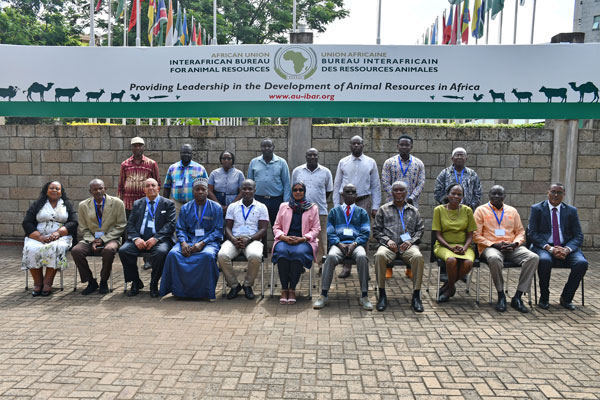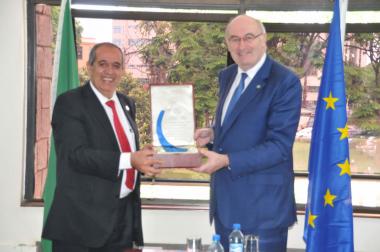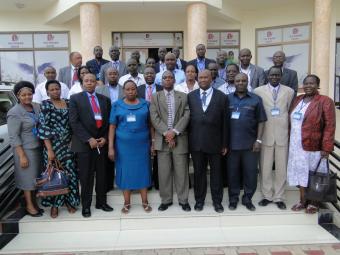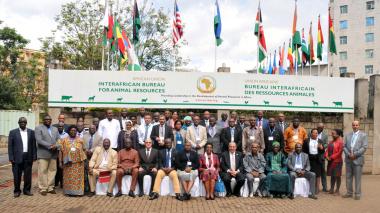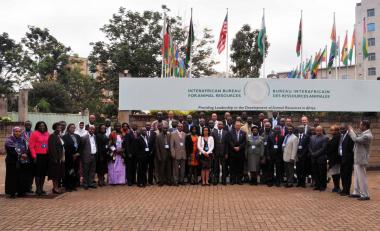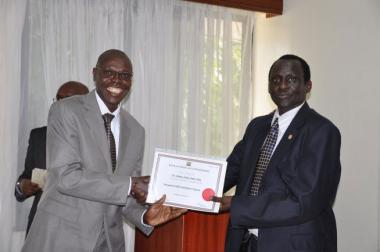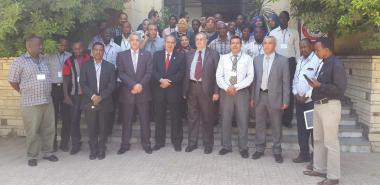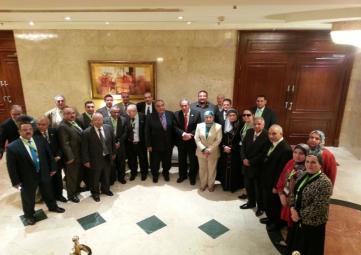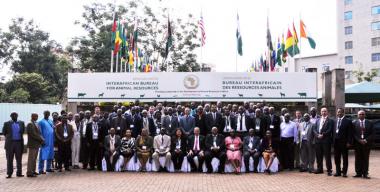
AU-IBAR, with support from the European Union (EU) through the Enhancing Sustainable Fisheries Management and Aquaculture Development in Africa - Phase Two Project (FishGov 2), organised a training programme for AU Member States. The session, held on March 7th and 8th, 2024, in the AU-IBAR offices in Nairobi, Kenya, was designed to familiarise attendees with the recently completed Africa Fisheries and Aquaculture Data Repository (AFADATA). This effort aimed to improve data entry and transmission capabilities between member states, allowing for improved management of fisheries and aquaculture resources (with a focus on capture fisheries and aquaculture).
Introduction
The workshop brought together delegates from a diverse range of AU Member States, comprising Directors of Fisheries from Libya, the Democratic Republic of Congo, the Central African Republic, Sudan, South Sudan, Somalia, Chad, as well as stakeholders from the African Union Centres of Excellence, notably the University of Cape Coast (UCC) in Ghana, who played a crucial role in the development of the database. Facilitated by UCC and AU-IBAR experts, participants actively participated in extensive discussions and hands-on sessions, aimed at enhancing their comprehension of AFADATA and its potential implications for fisheries governance.
Opening Session
Speeches were given by Prof. Noble Asare, representing the University of Cape Coast, Ghana; and Dr. Dr. Huyam Salih, Director of AU-IBAR, who officially opened the meeting. Their insights provided a guiding framework for the discussions and practical sessions that followed, reinforcing the collective commitment to harnessing data-driven solutions for sustainable development in the fisheries and aquaculture sectors.
Prof. Noble Asare, representing the University of Cape Coast, Ghana, emphasized the critical role of data management in fisheries and aquaculture. He stressed the need for robust systems like AFDATA to streamline data collection, analysis, and dissemination processes. Prof. Asare's remarks underscored the potential of AFADATA to revolutionize how stakeholders engage with fisheries data, ultimately leading to more informed decision-making and sustainable resource management.
Dr. Huyam Salih, Director of AU-IBAR, echoed these sentiments, emphasising AU-IBAR's commitment to advancing fisheries governance in Africa. She highlighted the collaborative efforts driving the development of AFADATA and expressed optimism about its transformative impact on the continent's fisheries and aquaculture sectors. Dr. Salih emphasised the workshop's role in equipping AU Member States with the necessary tools and knowledge to leverage AFADATA effectively, fostering greater transparency, accountability, and cooperation across the region.
Objectives of the Workshop
Dr. Mohamed Seisay, Blue Economy Expert and Project Coordinator at AU-IBAR, delineated the objectives of the workshop, emphasizing the significance of AFDATA in advancing fisheries management across Africa. The workshop aimed to equip participants with practical skills for utilizing the database effectively.
Technical Sessions
Led by experts from AU-IBAR and UCC, the technical sessions delved into the functionalities of AFDATA and provided hands-on training in data inputting and transmission. Participants gained insights into the database architecture, user interface, and best practices for data management. Moreover, country-specific insights were shared, highlighting existing data collection systems, challenges, and opportunities for improvement.
Meeting Outcomes and Recommendations
The workshop yielded several key outcomes, including the training of AU Member States on AFADATA and enriching the database with valuable insights from participants. Recommendations were put forth to ensure the sustainability and effectiveness of AFADATA, such as organising virtual training sessions, clarifying data access protocols, and fostering collaboration among member states for data sharing.
Closing Session
The workshop concluded with a symbolic handover of laptops to participants, symbolising the commitment to enhancing data capabilities across member states. Expressing gratitude to AU-IBAR for organizing the event, participants highlighted the importance of continued collaboration and knowledge sharing to address the challenges facing fisheries and aquaculture sectors in Africa. The knowledge sharing would further be strengthened through the establishment of a Community of Practice; as highlighted by Dr. Huyam Salih, AU-IBAR Director during the close of the workshop.

Next Steps
In conclusion, the training workshop marked a significant milestone in advancing fisheries governance in Africa. Through the utilization of data and the cultivation of collaboration among member states, AFADATA is poised to ignite sustainable development and conservation efforts for marine resources across the continent; including promote decision making on fisheries management. The insights gleaned from this training session will lay the groundwork for future initiatives, including the anticipated FishGov 3 Project. Integrated into AU-IBAR’s Animal Resources Information System (ARIS), AFADATA expands the system's capacity to capture data from AU Member States, thereby enhancing its support for effective fisheries and aquaculture management endeavours.
